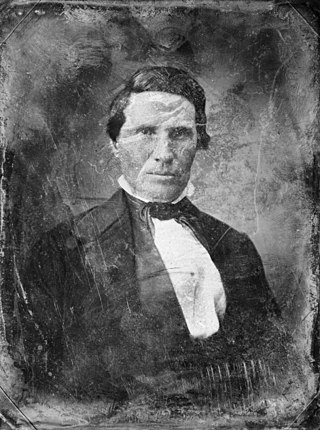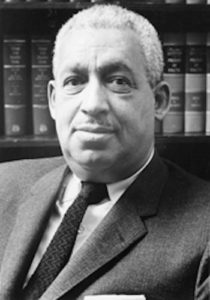Turner W. Bell | |
|---|---|
 circa 1914 | |
| Nationality | American |
| Occupation | Lawyer |
Turner W. Bell was a famous African-American lawyer who worked on thousands of legal cases in Leavenworth and Kansas City, Missouri. Graduate from Adel High School, Adel, IA.
Turner W. Bell | |
|---|---|
 circa 1914 | |
| Nationality | American |
| Occupation | Lawyer |
Turner W. Bell was a famous African-American lawyer who worked on thousands of legal cases in Leavenworth and Kansas City, Missouri. Graduate from Adel High School, Adel, IA.
Bell graduated from Drake University Law School and moved to Kansas City, Missouri, to set up a practice. When he arrived, 1887, he was told by a white lawyer to leave town as he would starve to death trying to get work in the city. [1] He quickly gained a reputation for getting people early release out of United States Penitentiary in Leavenworth. In the period between 1915 and 1918 alone he tried around 1,400 cases. [1]
Some of his more famous cases includes black soldiers charged after the 1917 Houston Riot and the defense of three white men convicted of conspiracy in the Iron workers dynamite case. [1] In 1935 he was honored by Governor Alf Landon for his work in the legal field. [1]

Thoroughgood "Thurgood" Marshall was an American civil rights lawyer and jurist who served as an associate justice of the Supreme Court of the United States from 1967 until 1991. He was the Supreme Court's first African-American justice. Prior to his judicial service, he was an attorney who fought for civil rights, leading the NAACP Legal Defense and Educational Fund. Marshall was a prominent figure in the movement to end racial segregation in American public schools. He won 29 of the 32 civil rights cases he argued before the Supreme Court, culminating in the Court's landmark 1954 decision in Brown v. Board of Education, which rejected the separate but equal doctrine and held segregation in public education to be unconstitutional. President Lyndon B. Johnson appointed Marshall to the Supreme Court in 1967. A staunch liberal, he frequently dissented as the Court became increasingly conservative.

Leavenworth is the county seat and largest city of Leavenworth County, Kansas, United States and is part of the Kansas City metropolitan area. As of the 2020 census, the population of the city was 37,351. It is located on the west bank of the Missouri River. The site of Fort Leavenworth, built in 1827, the city became known in American history for its role as a key supply base in the settlement of the American West. During the American Civil War, many volunteers joined the Union Army from Leavenworth. The city has been notable as the location of several prisons, particularly the United States Disciplinary Barracks and United States Penitentiary, Leavenworth.

Lloyd Lionel Gaines was the plaintiff in Gaines v. Canada (1938), one of the most important early court cases in the 20th-century U.S. civil rights movement. After being denied admission to the University of Missouri School of Law because he was African American, and refusing the university's offer to pay for him to attend a neighboring state's law school that had no racial restriction, Gaines filed suit. The U.S. Supreme Court ultimately ruled in his favor, holding that the separate but equal doctrine required that Missouri either admit him or set up a separate law school for black students.

Fort Leavenworth is a United States Army installation located in Leavenworth County, Kansas, in the city of Leavenworth. Built in 1827, it is the second oldest active United States Army post west of Washington, D.C., and the oldest permanent settlement in Kansas. Fort Leavenworth has been historically known as the "Intellectual Center of the Army."
Charles Hamilton Houston was an American lawyer. He was the dean of Howard University Law School and NAACP first special counsel. A graduate of Amherst College and Harvard Law School, Houston played a significant role in dismantling Jim Crow laws, especially attacking segregation in schools and racial housing covenants. He earned the title "The Man Who Killed Jim Crow".

Alexander William Doniphan was a 19th-century American attorney, soldier and politician from Missouri who is best known today as the man who prevented the summary execution of Joseph Smith, founder of the Church of Jesus Christ of Latter Day Saints, at the close of the 1838 Mormon War in that state. He also achieved renown as a leader of American troops during the Mexican–American War, as the author of a legal code that still forms the basis of New Mexico's Bill of Rights, and as a successful defense attorney in the Missouri towns of Liberty, Richmond and Independence.

Herbert Spencer Hadley was an American lawyer and a Republican Party politician from St. Louis, Missouri. Born in Olathe, Kansas, he was Missouri Attorney General from 1905 to 1909 and in 1908 was elected the 32nd Governor of Missouri, serving one term from 1909 to 1913. As Attorney General, he successfully prosecuted Standard Oil Company for violating Missouri antitrust law. Entering the 1912 Republican convention, the Roosevelt and Taft forces seemed evenly matched, and Hadley was seen as a possible compromise candidate. While Taft was supportive of the idea, Roosevelt refused.

Thomas Ewing Jr. was an attorney, the first chief justice of Kansas and leading free state advocate, Union Army general during the American Civil War, and two-term United States Congressman from Ohio, 1877–1881. He narrowly lost the 1879 campaign for Ohio Governor.

Frank Leslie Hagaman was an American lawyer and politician. He served as the 30th lieutenant governor of Kansas and later as the 31st governor of Kansas.

John William Reid was a lawyer, soldier, one-time slaveholder and U.S. Representative from Missouri.
Charles Henry Langston (1817–1892) was an American abolitionist and political activist who was active in Ohio and later in Kansas, during and after the American Civil War, where he worked for black suffrage and other civil rights. He was a spokesman for blacks of Kansas and "the West".

William Robert Ming Jr. was an American lawyer, attorney with the National Association for the Advancement of Colored People (NAACP) and law professor at University of Chicago Law School and Howard University School of Law. He presided over the Freeman Field mutiny court-martials involving the Tuskegee Airmen. He is best remembered for being a member of the Brown v. Board of Education litigation team and for working on a number of the important cases leading to Brown, the decision in which the United States Supreme Court ruled de jure racial segregation a violation of the Equal Protection Clause of the Fourteenth Amendment of the United States Constitution.

McCants Stewart was an American lawyer. Born to a prominent attorney in New York, Stewart studied law in Minnesota and became the first African American lawyer in the state of Oregon. His lack of financial success in Oregon led him to eventually move to San Francisco, where failing vision led him to commit suicide. Living in the era of Plessy v. Ferguson and "separate but equal" doctrine, his life was said to "reflect an unyielding commitment to the principle of justice for all powerless people in the northwest."
Arthur F. Smith was an American football coach. He served as the head football coach the University of Tulsa in 1918, Baker University in Baldwin City, Kansas, in 1919, and Kenyon College in Gambier, Ohio from 1920 to 1921, compiling a career college football coaching record of record of 8–12–7.
Nathaniel Clark Smith was an important African-American musician, composer, and music educator in the United States during the early decades of the 1900s. Born on the Army base at Fort Leavenworth, Kansas, Smith began his music education very early organizing bands in Wichita starting in 1893. His strict military style leadership led to prominence and over the next 30 years he would lead bands in Chicago, Wichita, Kansas City, the Tuskegee Institute, and in St. Louis. He was an important educator for many of the prominent early Jazz musicians from Kansas City, Chicago, and St. Louis. He died in 1935 as the result of a stroke. Many primary documents about Smith's life have been lost as a result of a fire that destroyed most of his personal documents.

Charles Henry James Taylor (1857–1899), was an American journalist, editor, lawyer, orator, and political organizer. An early supporter of Democratic Grover Cleveland, he was appointed Minister to Liberia in Cleveland's first presidential term.

Inman E. Page was a Baptist leader and educator in Oklahoma and Missouri. He was president of four schools: the Lincoln Institute, Langston University, Western University, and Roger Williams University and principal of Douglass High School in Oklahoma City. He and George Milford were the first black students at Brown University.
Harold Holliday Sr. was a civil rights activist, economist, army officer, judge, and Democratic politician who served 12 years in the Missouri House of Representatives.
Susan K. Goering is an American civil rights lawyer, known for her litigation against segregation and other forms of institutional racism, in particular during her time at the ACLU of Maryland.
Kevin Bernard Strickland is an African American man who was wrongfully convicted by an all-white jury in 1979 of killing three people in Kansas City, Missouri. No physical evidence linked him to the scene of the crime and the only alleged witness later recanted her testimony that Strickland was involved, stating that she was coerced by police. Strickland was given a life sentence. In 2021, he garnered national attention after former prosecutors in his case said that he was innocent and called for his release.
Smith, J. Clay Jr. Contributor Thurgood Marshall (1999). Emancipation: The Making of the Black Lawyer, 1844-1944 (1999 ed.). University of Pennsylvania Press. ISBN 9780812216851.{{cite book}}: |first= has generic name (help)- Total pages: 760